Top 10 Circle Alternatives for AI-Powered Learning Communities (2026)

TL;DR
- What it enables: AI-powered community platforms automate tasks and personalize learning journeys for improved engagement.
- What it includes: Integrated LMS, advanced analytics, automated moderation, onboarding workflows, and branding tools.
- Key elements: Look for AI-driven personalization, robust analytics, seamless mobile experience, and scalable pricing.
- Top 10 for 2026 include: Disco, Mighty Networks, 360Learning, Kajabi, Sana, Absorb LMS, LearnWorlds, Thinkific, Docebo, Canvas.
- Why it matters: Creates data-driven, personalized learning ecosystems that foster meaningful connections and scalable growth.
Why Community Platforms Need AI
Artificial intelligence is becoming an important tool for streamlining and improving the way learning communities are run. By automating repetitive tasks like sending reminders, tracking analytics, and managing member interactions, AI reduces the administrative burden for teams. This allows leaders to focus their energy on creating meaningful experiences for their members.
Even more impactful, AI can personalize the learning journey for every individual. Whether it’s recommending relevant resources or adjusting content based on progress, AI creates an environment where every learner feels supported. This kind of tailored approach not only improves engagement but also builds stronger connections within the community.
What to Look for in an AI-Powered Community
An AI-powered community platform should feel like a natural extension of your brand and learning goals—intuitive, responsive, and purpose-built for engagement. The most effective tools don’t just connect members; they create an environment where learning and collaboration thrive.
An integrated learning management system (LMS) is a cornerstone feature. It ensures that courses, materials, and progress tracking are seamlessly woven into the community experience. This type of cohesion allows members to focus on learning without distractions or the need to navigate between disjointed tools.
Advanced analytics enable you to stay attuned to your community’s needs. By leveraging AI to interpret member activity, you can uncover patterns, fine-tune content, and ensure that interactions remain relevant and impactful. It’s about providing insights that help you make confident, informed decisions.
With automated moderation, fostering a respectful, engaging environment becomes effortless. AI can step in to monitor conversations, filter out disruptive behaviors, and ensure that discussions remain constructive. This eliminates the need for constant manual oversight while keeping the space welcoming and productive.
Onboarding workflows powered by AI create a personalized welcome for every member. Whether it’s guiding a new participant to their first discussion or recommending courses based on their interests, a smooth onboarding process sets the stage for long-term engagement.
Finally, branding tools allow you to make the platform your own. Customizable interfaces, white-labeling options, and cohesive design capabilities ensure that the community reflects your organization’s identity, enhancing both trust and loyalty.
Key Considerations When Comparing Circle.so and Its Alternatives
When evaluating Circle.so against other AI-powered learning community platforms, it's essential to understand its advantages, limitations, and what features to prioritize in alternatives. This table provides a concise comparison to guide your decision-making.
Circle.so AdvantagesCircle.so LimitationsFeatures To Look For When Considering Circle.so AlternativesUser-friendly interface for community buildingLacks advanced AI features for personalizationAI-driven course creation and learning personalizationFlexible monetization optionsLimited LMS functionality for structured learningIntegrated LMS with robust analyticsGood integration with external toolsCustomization options for branding are limitedDeep customization and white-label capabilitiesSolid community engagement toolsWeak mobile app experience compared to desktopSeamless mobile experienceCohort-based learning supportExpensive as community size scalesScalable pricing for growing communities
1. Disco
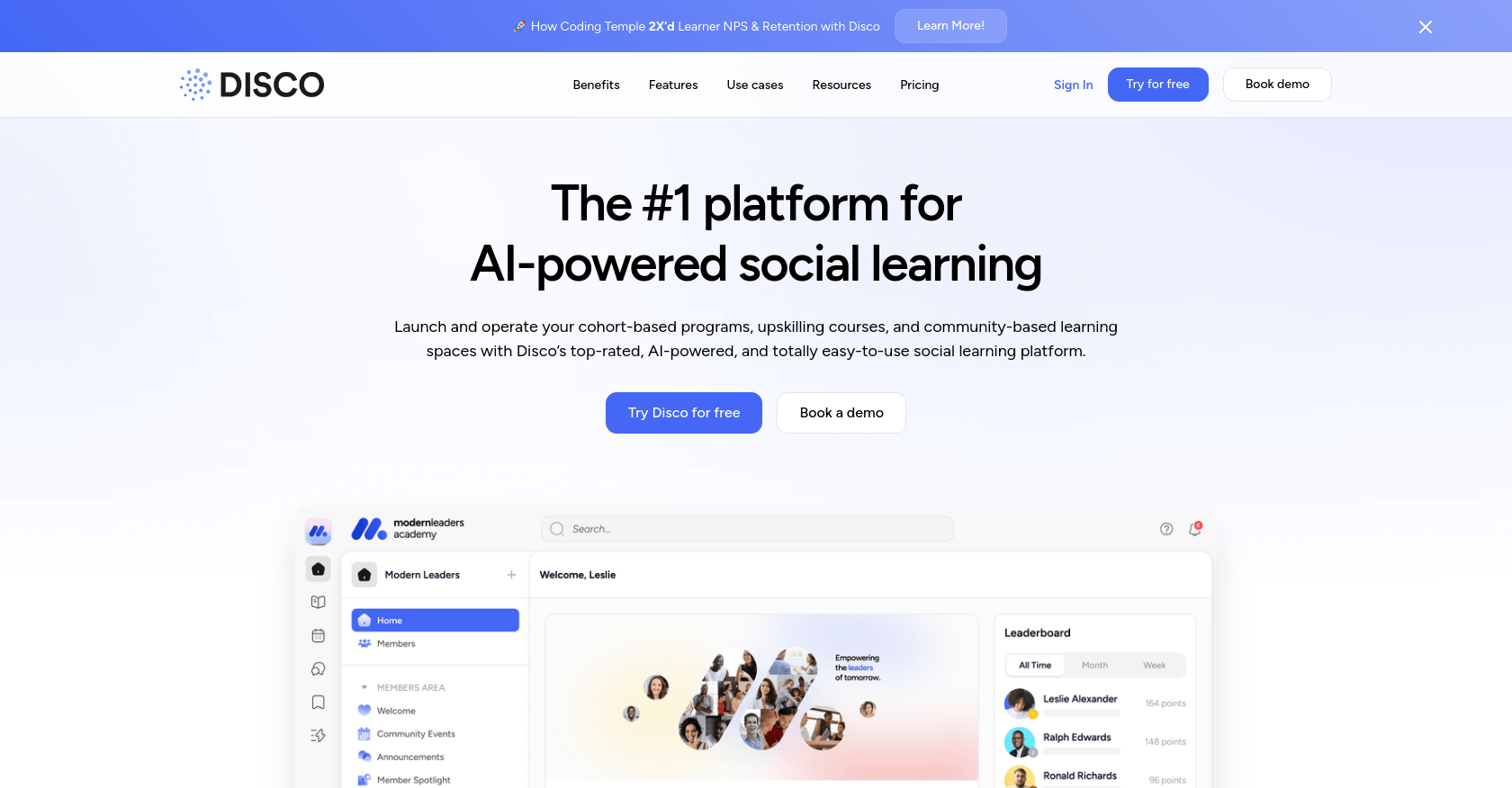
Disco is reshaping the way learning communities operate by seamlessly blending AI-driven technology with intuitive design. It’s a platform made for organizations that want to bring people together, deliver impactful learning, and scale with confidence. At its core, Disco combines cohort management, content creation, and analytics into one cohesive system, making it easier than ever to design and run meaningful programs.
One of Disco’s standout features is its AI-assisted course builder, which takes the guesswork out of curriculum design. Whether you’re crafting a new course or refining an existing one, AI generates outlines, assessments, and learning paths tailored to your goals. Alongside this, Disco’s moderation and discussion tools ensure that every community interaction is productive and engaging, with channels, threads, and direct messaging that keep the conversation flowing.
Disco doesn’t stop at content—it makes learning social. With live events and collaboration features, you can host sessions, foster group discussions, and even integrate tools like Zoom for seamless participation. Plus, every community feels unique with Disco’s brand customization options and unified payment systems, which allow organizations to manage memberships, subscriptions, and course sales without the hassle of external tools. This isn’t just a platform; it’s a partner for building modern, connected learning experiences.
2. Mighty Networks
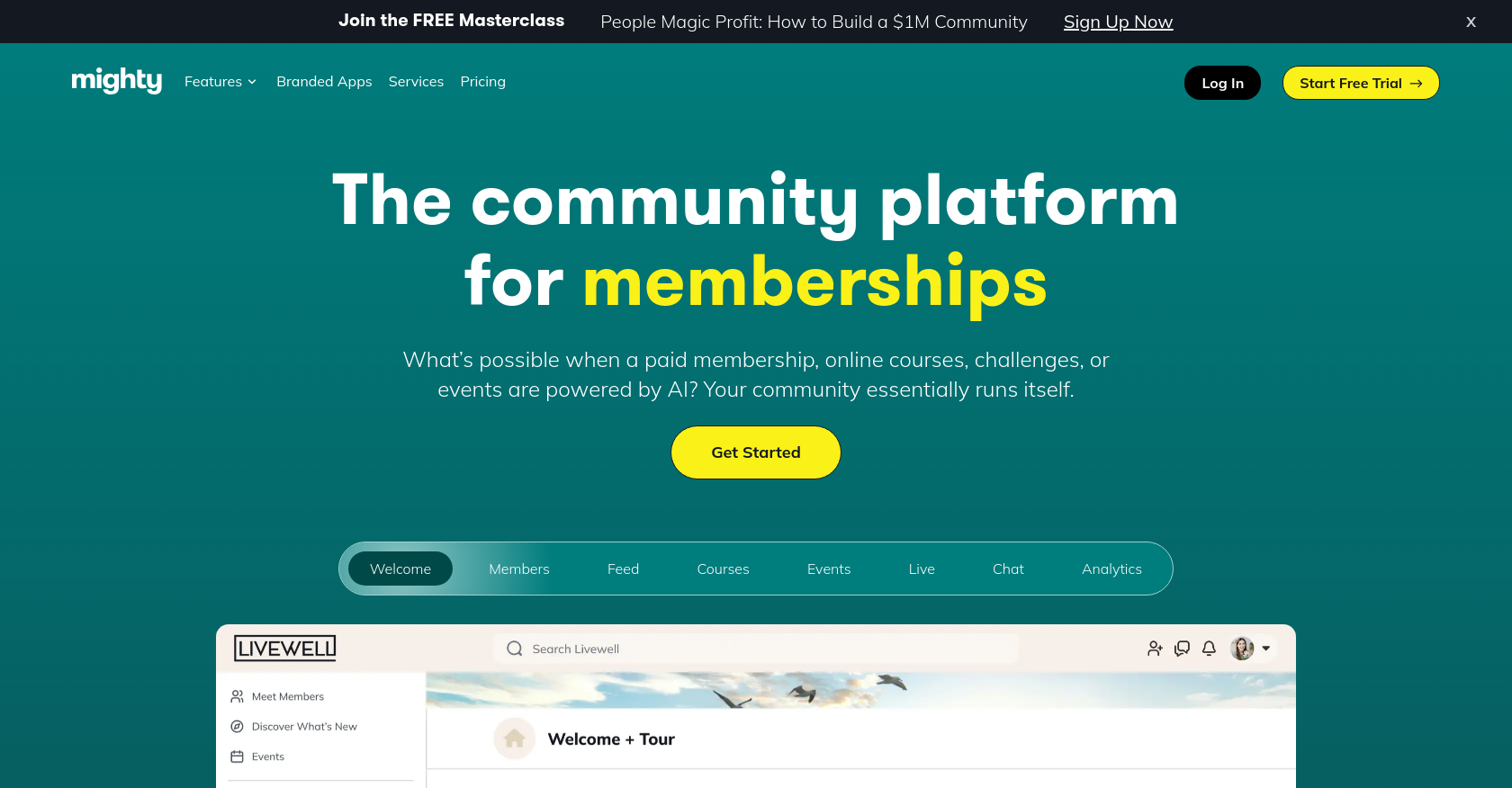
Mighty Networks is built for creators and organizations focused on fostering meaningful connections and monetizing their expertise. It provides a platform where community-building meets paid memberships, offering a streamlined way to engage members while delivering value.
What stands out is the platform’s intuitive mobile-first design, ensuring members can interact seamlessly across devices. This accessibility is combined with monetization tools that make it simple to charge for memberships, courses, or exclusive events. For organizations looking to expand their offerings, Mighty Networks includes course creation add-ons, enabling leaders to integrate educational content into their communities with minimal effort.
In addition to its educational tools, Mighty Networks emphasizes structure and engagement. Features like event scheduling and moderation tools help community leaders maintain an organized and active space, while its flexible design supports both intimate groups and large-scale networks.
3. 360Learning
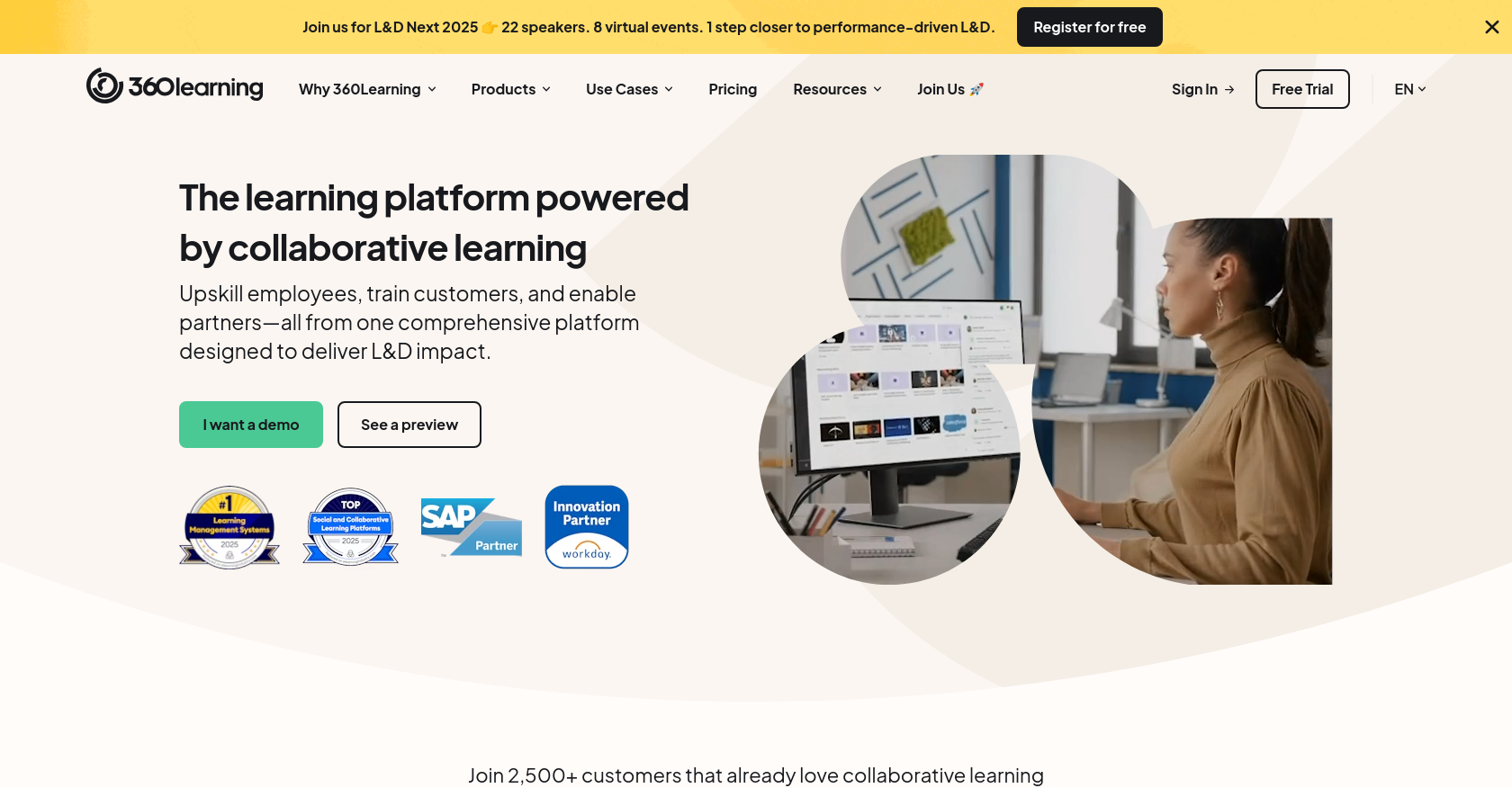
360Learning takes a fresh approach to workplace learning by centering collaboration and peer-driven engagement. It’s a platform designed to bring teams together, using AI to make course creation faster and more intuitive while delivering personalized recommendations to learners.
At the heart of 360Learning is collaborative course authoring, which enables teams to co-create training programs in real time. This feature ensures that content stays relevant and reflects the expertise of multiple contributors. Pair that with peer feedback loops, and you have a system that thrives on interaction, where employees can share insights, refine ideas, and continuously improve learning materials.
To keep learners engaged, 360Learning integrates gamification tools, adding an element of fun and motivation with features like leaderboards and achievements. The platform also provides team-based analytics, offering actionable insights into learner progress and program impact. These tools empower organizations to track what’s working, identify skill gaps, and ensure every learning initiative delivers measurable outcomes.
4. Kajabi
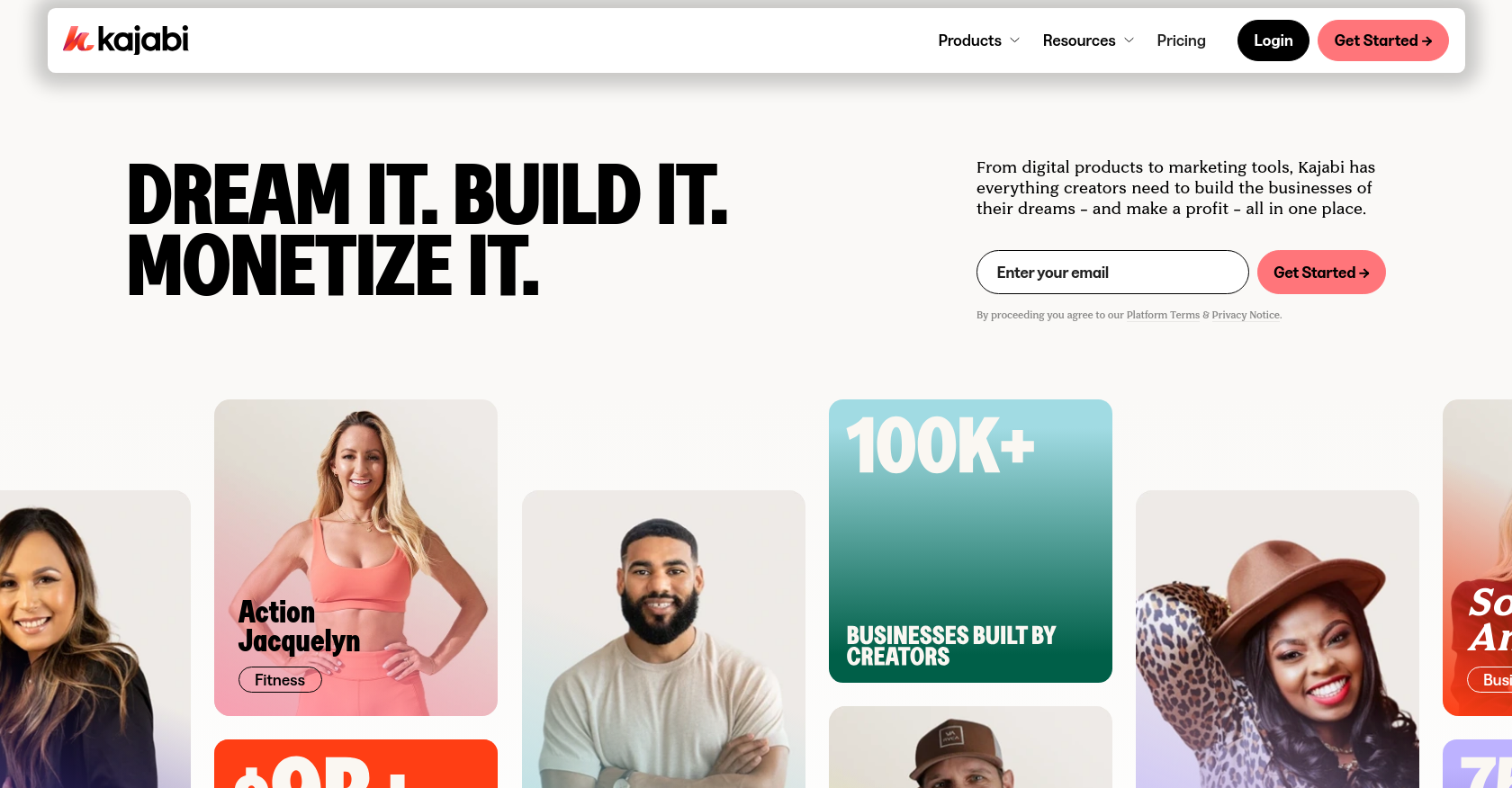
Kajabi positions itself as a platform for creators and businesses to manage every aspect of their digital offerings in one place. From marketing to community engagement, Kajabi provides tools that streamline operations while maintaining a focus on user-friendly design. Its all-in-one approach is ideal for those looking to combine content delivery with revenue-driving features.
At the heart of Kajabi’s value is its automated marketing funnels, which simplify the process of turning leads into members or customers. This automation allows users to focus on refining their offerings rather than dedicating hours to manual marketing. In addition, built-in email marketing tools enable seamless communication, integrating directly with courses and membership programs for a cohesive learning and engagement experience.
Kajabi also excels in creating customizable course marketing pages that highlight educational content in a polished and professional way. These pages are designed to attract learners while also serving as a hub for information about the programs offered. To support connection and interaction, its community forums foster engagement, encouraging participants to share insights and build relationships. This combination of marketing, education, and community tools makes Kajabi a strong choice for those building scalable learning businesses.
5. Sana

Sana is setting a new standard for knowledge accessibility by weaving personalization into every aspect of the learning experience. Its AI-powered platform is designed to ensure that learners can access the right information at the right moment, minimizing friction and maximizing efficiency.
One of Sana’s defining strengths lies in its real-time AI answers, which allow learners to find clarity without interrupting their workflow. This feature transforms learning into a seamless process, whether it’s used during live sessions or while navigating personalized content. With speech recognition built into the platform, learners also gain the ability to interact naturally, creating a more intuitive and hands-free experience.
Sana’s approach to skill-building is equally forward-thinking. Through automatic skill tracking, the platform continuously maps learner progress, identifying areas of strength and where additional focus is needed. Combined with adaptive content suggestions, Sana offers a tailored learning journey that evolves alongside each individual’s goals. It’s a system designed not just to deliver knowledge but to adapt, ensuring every learner feels both supported and challenged.
6. Absorb LMS
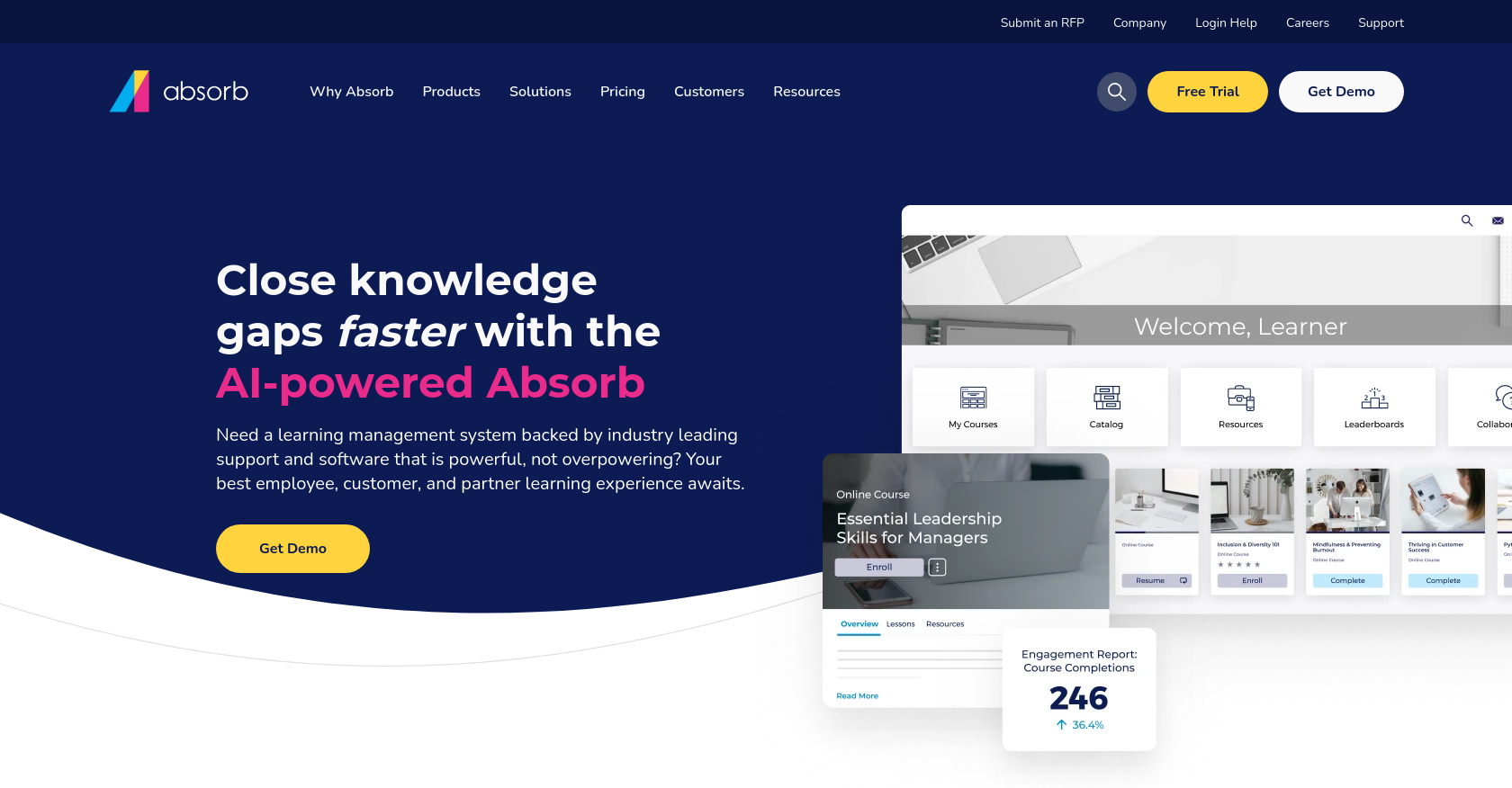
Absorb LMS combines a polished, corporate-friendly interface with the intelligence of AI to redefine workplace learning. It’s designed to simplify the complex, ensuring every learner and administrator has exactly what they need to succeed.
One of its most notable features is its custom user portals, which make it possible to deliver learning experiences that feel authentically branded and intuitive. Paired with mobile app integration, learners can stay connected to training programs from anywhere—whether commuting, traveling, or working remotely. The platform ensures that no matter where learning takes place, it remains seamless and accessible.
To streamline compliance and professional growth, Absorb LMS uses automated certifications to track achievements and ensure learners meet milestones effortlessly. Add to this its AI-powered analytics and reporting, and organizations gain valuable insights into learner engagement and performance. These insights don’t just highlight what’s working—they create opportunities to optimize and improve learning outcomes with precision.
7. LearnWorlds
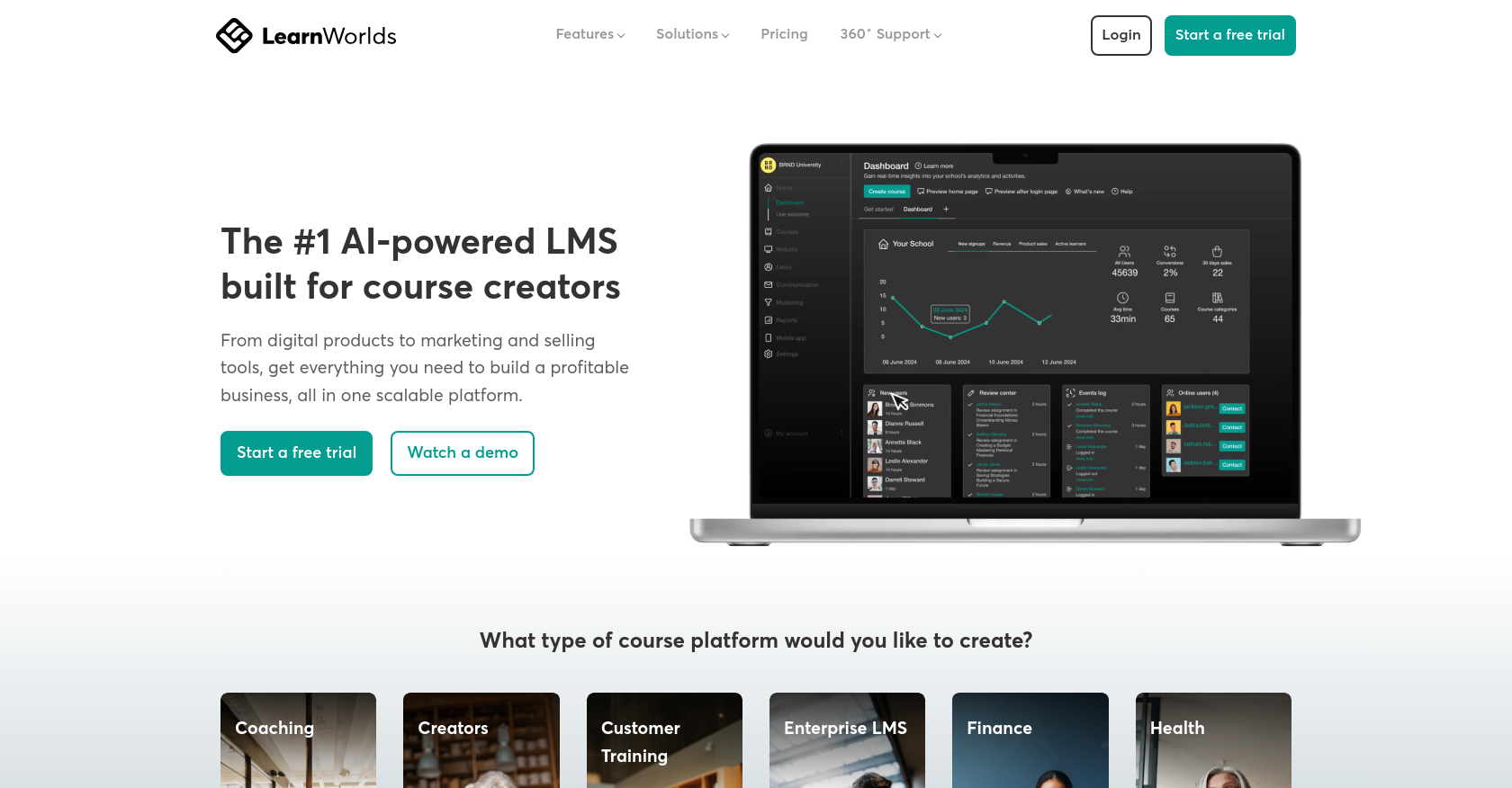
LearnWorlds positions itself as a platform dedicated to making learning dynamic, interactive, and personalized. It offers tools designed to transform static learning materials into engaging experiences that actively involve learners and encourage participation.
One of the defining features of LearnWorlds is its interactive video modules, which allow educators to embed questions, clickable elements, and branching scenarios directly into videos. This transforms videos from passive content into tools for active engagement, helping learners stay connected with the material.
For those focused on evaluation and feedback, LearnWorlds includes built-in quiz banks that streamline the creation of assessments. This feature helps organizations measure learner progress while providing meaningful insights into skill development.
A strong emphasis on branding sets LearnWorlds apart. With its white-label options, organizations can customize every aspect of their learning environments—ensuring that the experience aligns seamlessly with their unique identity. From the interface to the website, every detail can reflect the organization’s brand.
To foster connection and collaboration, LearnWorlds also supports community-hosted events. Virtual meetups and live webinars create opportunities for learners to engage with each other, share insights, and build relationships within the learning ecosystem.
8. Thinkific
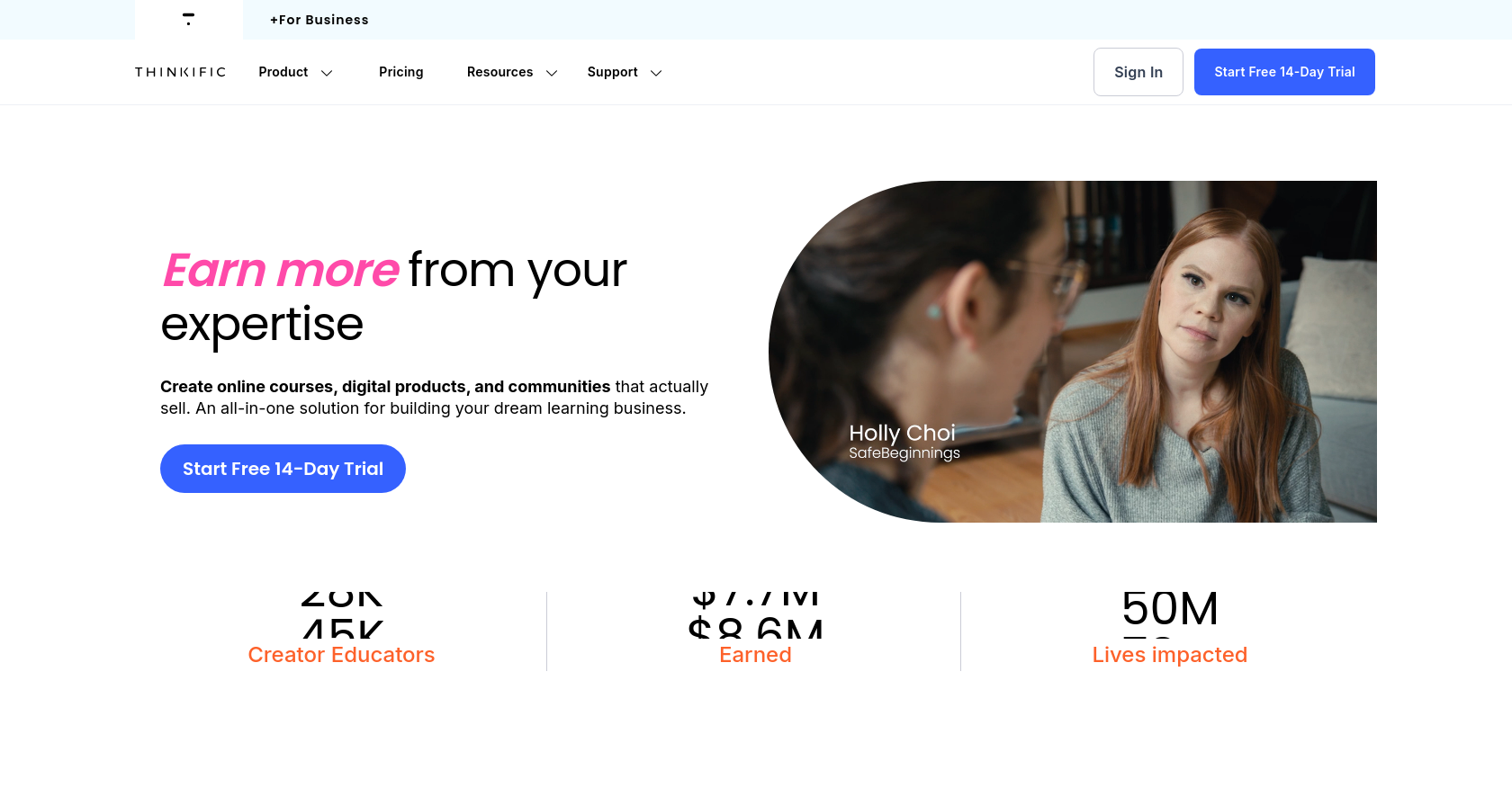
Thinkific presents itself as a platform built for simplicity and scale. It’s designed to make course creation accessible while offering enough depth to support growing organizations.
At its core is an intuitive drag-and-drop course builder that removes the technical barriers to launching professional learning experiences. Whether you’re structuring a single course or managing a suite of programs, Thinkific’s tools are tailored to streamline the process, allowing creators to focus on content rather than logistics.
For organizations looking to foster deeper engagement, Thinkific offers membership and community add-ons. These features enable creators to build spaces for interaction and shared learning, turning courses into connected ecosystems. And, with a built-in payment gateway, supporting subscriptions or one-time purchases is seamless, reducing friction for learners and administrators alike.
Flexible tiered pricing packages allow Thinkific to cater to a wide range of users—from solo course creators just getting started to larger teams scaling their programs. The platform combines ease of use with functionality, making it a practical choice for businesses seeking a straightforward way to launch and grow their digital education initiatives.
9. Docebo

Docebo leans into the complexities of enterprise learning, offering tailored solutions for organizations managing global training programs. With AI woven into its foundation, it’s designed to streamline operations, deliver personalized learning, and foster collaboration at scale.
One standout feature is its automated content tagging, which uses AI to categorize and optimize learning materials, cutting down on administrative overhead and helping learners find what they need faster. For businesses prioritizing regulatory standards, Docebo excels in corporate compliance training, offering extensive modules to ensure alignment with industry requirements.
Docebo’s social learning workflows elevate the learning experience, enabling teams to connect, collaborate, and share knowledge seamlessly. Additionally, the platform’s multilingual support makes it a strong choice for organizations operating across diverse regions. Together, these features create a system that balances flexibility with the demands of enterprise-scale learning.
10. Canvas
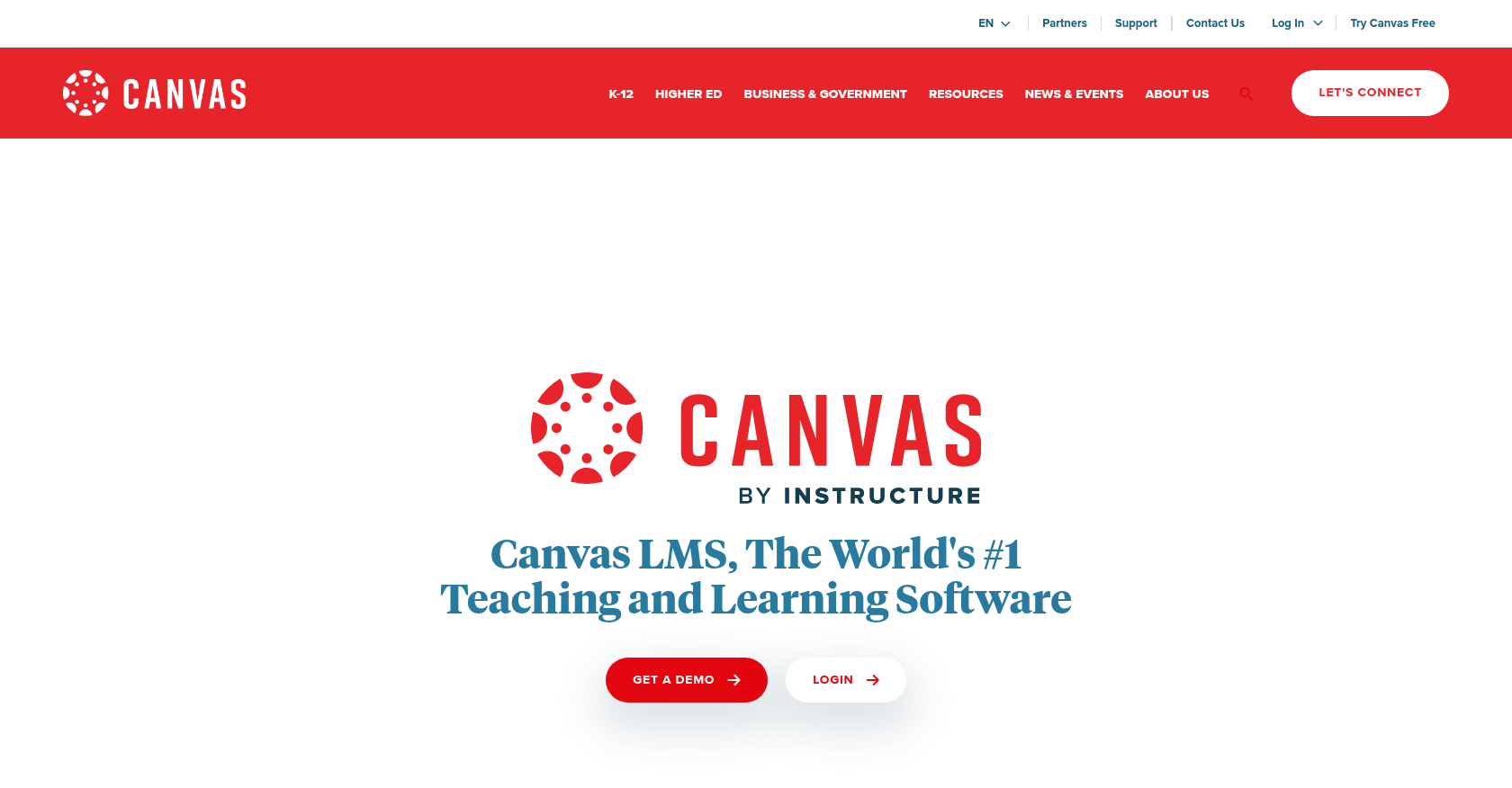
Canvas has long been a trusted platform for organizations seeking a reliable and adaptable learning management system. Its strength lies in balancing robust functionality with user-friendly design, making it a valuable resource for creating high-quality learning experiences across industries.
At its core, Canvas stands out with powerful course creation tools that make structuring and managing content straightforward. Its cloud-based system ensures that users always operate with the most up-to-date features, removing the hassle of manual updates. This reliability is paired with comprehensive assessment tools, such as its Gradebook and quiz capabilities, which help organizations track progress and measure outcomes effectively.
What sets Canvas apart is its adaptability through LTI-compliant integrations. Whether connecting with tools like G Suite, Microsoft Teams, or Adobe, Canvas allows organizations to create a seamless learning ecosystem tailored to their specific needs. It’s a solution designed to scale, ensuring that both educators and learners can focus on impactful, personalized engagement without being held back by technical limitations.
Moving Forward
AI is reshaping the way we think about learning communities, not just by making tasks more efficient, but by turning engagement into a personalized, data-driven experience. With features like real-time insights, automated workflows, and tailored content delivery, AI enables organizations to build smarter, more connected learning ecosystems. It’s not just about managing communities—it’s about creating spaces where meaningful interactions and growth happen naturally.
Selecting the right platform is key. Each organization will have unique needs, from scaling programs to deepening learner engagement. Platforms like Disco offer a seamless solution, combining the power of AI with tools designed to amplify community-driven learning. Whether it’s designing adaptive programs or simplifying operations, the right platform will help transform your vision into scalable, impactful outcomes.
If you’re ready to see how the future of learning is already here, book a demo to explore Disco’s AI-driven tools for yourself. Let us show you how we’re helping organizations design transformative learning experiences. Book a demo now and discover what’s possible when you combine learning, connection, and technology in one beautifully crafted platform.









